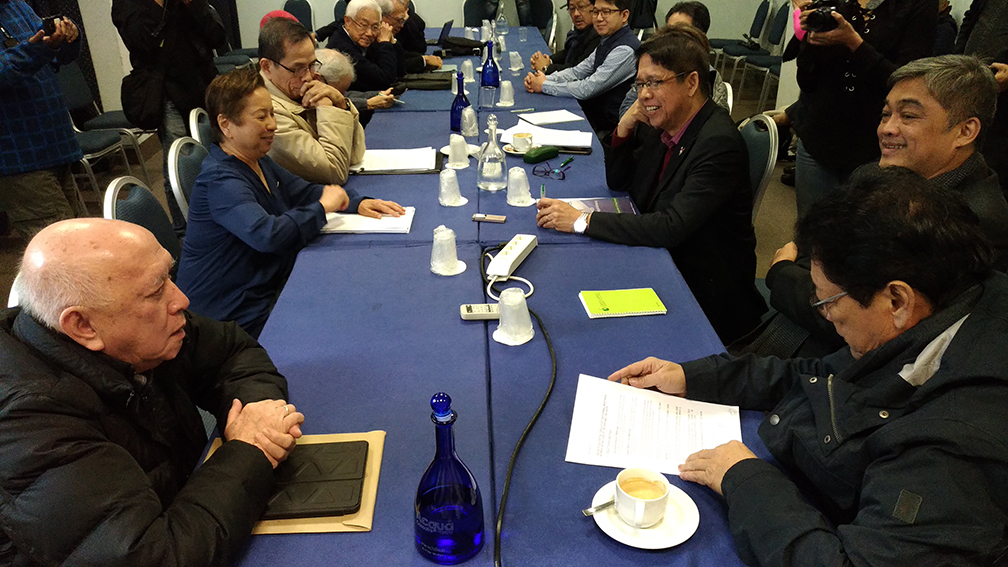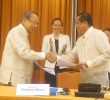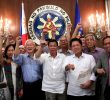
Peace panels from the National Democratic Front of the Philippines and the government during the third round of formal talks in Rome, Italy held from January 19 to 25. (davaotoday.com file photo)
DAVAO CITY, Philippines – Peace advocates and militant farmers appealed to both panels of the government and the National Democratic Front of the Philippines to continue the peace negotiations despite the withdrawal of the unilateral ceasefires by both Parties.
Bishop Felixberto Calang, convenor of the Sowing the Seeds of Peace in Mindanao, said the government’s termination of the peace talks diminishes the gains achieved during the previous rounds of talks.
“This curtain call on the talks diminishes the significant agreements signed and the high level of optimism that we saw in the third round of talks in Rome, Italy,” Calang said.
For his part, Joseph Canlas, chairperson of Kilusang Magbubukid ng Pilipinas said “(F)armers want the peace negotiations to continue. We want the peace talks to help address the problem of land monopoly, landlessness of farmers, unemployment and to realize the equitable distribution of social wealth.
Canlas said, the continuation of peace talks “is in the best interest of farmers who are pressing for genuine land reform, land distribution, and real change under the Duterte administration.”
Calang agreed with the farmers in pushing for the peace negotiations even without ceasefire until the roots of the armed conflict are resolved.
“We believe it is still possible for the negotiations to continue even if armed skirmishes will serve as a thorny backdrop to the talks, as this had been the prevailing condition under the Ramos, Estrada, and Arroyo governments,” he said.
“We reiterate that what is important right now is for us to see that there is no cessation of the talks even if it seems difficult at the moment to realize a cessation of hostilities,” he added.
Pedro Arnado, KMP-Southern Mindanao spokesperson said that “just peace” means food for their families.
“For us farmers, just peace means food for our families, education for our children and recognition of our right to the land we till,” Arnado said.
“We call for the continuation of the peace talks and compliance to the Comprehensive Agreement on Respect for Human Rights and International Law (CARHRIHL) to protect civilians and all parties to the armed conflict,” Arnado added.
Arnado said that the government “should realize that people in the countryside are supporting and even joining the armed revolution because of the systemic and chronic crisis that is worsened by the government’s failure to address the most basic problems of the rural Philippines.”
“Historically, it is the peasant masses that have made the ultimate sacrifices to achieve peace. Buhay na ang ibinuwis ng mga magsasaka para sa lupa at kapayapaan. The cost of peace is too expensive, farmers have paid it with their lives,” he added.
KMP, however, said that the ultimate goal of the peace talks is to resolve the armed conflict and achieve cessation of hostilities, “that wouldn’t be possible at this period when there are conflicting social classes and interest.”
On Saturday night, President Rodrigo Duterte made his announcement to end the peace talks with the communists.
Duterte also lifted on Friday the government’s own declaration of ceasefire, three days after the announcement of the Communist Party of the Philippines and the New People’s Army that they would withdraw their ceasefire effective on Feb. 10.
“The peace negotiation is a separate and distinct track of struggle to press for significant pro-people reforms,” Canlas said.
“While the NPA and President Duterte announced the termination of the unilateral interim ceasefires, it should not hinder the continuation of the talks that is gaining relevant developments with regard to discussions on the Comprehensive Agreement on Social and Economic Reforms particularly agrarian reform and rural development,” he said.
The recent round of peace talks between the GRP and the NDFP ended positively with both Parties signing the ground rules for the conduct of meetings on the CASER and reaching agreement to move the talks forward.
The fourth round of talks is scheduled on the first week of April this year. (davaotoday.com)









